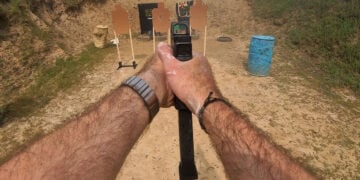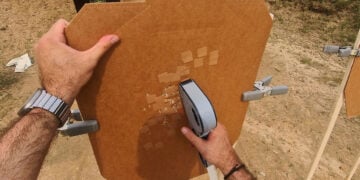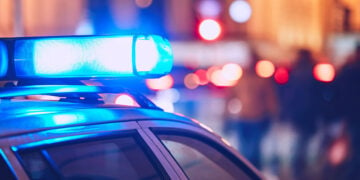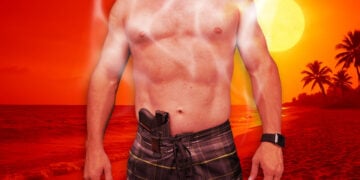There is no such thing as a one size fits all solution to the mental aspect of having to defend yourself. No matter how prepared your mind may be before it happens, everyone feels the same immediate after effects. But it is the long term after effects that can cause the real stress. The lasting effects are often called PTSD (Post Traumatic Stress Disorder), or Combat Stress, and are nothing like what you see on the news or in the movies. This does not mean that everyone who is forced to defend themselves will end up with PTSD, or that they will be out in the woods setting traps to take out as many people as they can. Real combat stress or PTSD is nothing like that in nearly all cases.
For our purposes we will use the idea that someone is defending themselves with a firearm. In addressing PTSD related to self defense, you have to start where the trauma really begins. This is not the point where you have to pull a weapon, or even make the decision that you are going to defend yourself. It starts in that split second that it takes for your body to react and actually fire the weapon. Your heart will be racing, your mind will be going a million miles an hour, you will be focused on your point of aim, you will be very aware of everything around you, and your mind will start shutting out the details of what is happening and just take general pictures. For some this means that you don’t really hear things, and for others it will mean that they forget important things that happen. There is no way around it; this is a complete reflex that you can’t train your way out of unless you are constantly in that same situation.
After the event is over, there is always panic, disorientation, hyper vigilance, and eventually a sense of complete calm about the situation. Those things are common in everyone who is forced to defend themselves, no matter the outcome of the situation. The onset of PTSD comes later, after you have had time to stop and think about things and how the event transpired. Most of the people that have to defend themselves have guilt and depression, and they tend to turn these things inward. They will ask questions like “What could I have done better?” or “Why did I have to shoot him/her?” and it will seem like there is no good answer. In some cases other symptoms like intrusive thoughts or dreams about the situation, a heightened startle response, constant hyper vigilance, lack of interest in activities, separation from family and friends, and being uncomfortable in crowds or public places can come about and hit you when you least expect it. These things will seem to have little to no cause, and will really shake you up. The onset of these symptoms can be delayed in some cases for years after the event.
“What could I have done better?”
The simple answer is nothing. Training and practice are the key elements in everything that leads up to that split second decision. Your mind and body are actually running at peak performance when you are in a life or death situation. Your brain will naturally stop your conscious mind from interfering in what needs to get done, and in effect “You” are taken out of the equation. What you do is based on trained physical reaction, nothing more, and nothing less. So there is nothing that you can do better or worse in any given situation.
“Why did I have to shoot him/her?”
Self defense is a natural human reaction. Ultimately you are not deciding to do anything. Your attacker is forcing the choice on you. Self Defense or Death! Some have called this “Fight or flight” or “Primal Instinct”, but no matter what you call it, you have very little control when this happens. No matter how much you train or practice in self defense, less than 1 tenth of all self defense cases are due to a conscious physical action. The trigger for self defense is based on your perception of danger. The more danger that you feel you are in, the more your actions become reaction. In most cases, there is no choice, it is life or death.
The addition of post incident stressors can greatly affect your ability to cope with the trauma that you have just experienced. Things like law enforcement involvement by investigating the incident, and people constantly asking you what happened can cause you to feel the after affects far more intensely, so it is important to tell those that ask that you do not want to discuss it. However, you will want to find someone that you can trust that, and discuss it with them, this is because of the amount of mental stress on you after the incident. Make sure that the discussions about the incident progress at a pace that you are comfortable with. If you over do it, you will push yourself into feeling worse about the situation. Also, when it comes to the questions that law enforcement have for you, those questions are not a matter of attacking you or trying to find an inherent wrong on your part, but are an attempt to come to a clear conclusion about what happened. That being said, it will help you and your mental state greatly to have an attorney present during any questioning outside the initial contact with law enforcement. This is because a majority of people feel as though they do not have to stand up for themselves to the police when there is an attorney present because that is what you are paying the attorney for.
A large number of those that carry will relax their need or desire to carry, or stop carrying all together as a result of an incident of self defense. This is a subconscious fear of the firearm, and what you are capable of with that firearm. The best way to combat this particular stressor is to get back out on the range. Being out on the range will bring back the understanding that you are the one in control of what happens with your firearm. Shooting with friends, courses on firearms and competition are several very beneficial ways to do this. The key is to avoid being on the range alone. Doing these things alone can create a sense of always being alone, and the idea here is to make sure that just because you went through a traumatic incident does not mean that you are alone, or that you are not in control. In a majority of people, the best option is to start with a different type of firearm. For example, if you use a pistol for self defense, work with a rifle instead, and then slowly build yourself back up to using a pistol on a regular basis.
With the use of a firearm for self defense, there is a sense of fame or popularity for what you have done. This is not always positive, but the majority of those that see self defense in a negative light are using what you have been through for their own personal gain, and ultimately what they do or say really has nothing to do with you. It is important to be honest with the media attention and also to be careful what you say to them. Often those that are interviewed after an incident say things like “I thought I was going to die” or “I just knew he was going to kill us”. This is an honest reflection of actual emotions, and these comments will usually get the media to spend as little time on you as possible. The less time the media spends on you, the better off you are emotionally. It is hard after an incident to have people constantly following you around waiting for you to snap.
Being arrested after an incident of self defense is almost guaranteed in this day and age. Especially in places like Wisconsin where people are not used to someone being ready and willing to stand up and defend themselves. Law enforcement will generally take you into custody at least long enough to determine if the incident was actual self defense, or if you were the aggressor. While self defense in Wisconsin is clearly a right, there are certain entanglements that go along with that right. Being arrested for protecting yourself or someone you care about can be devastating on the immediate situation. It causes emotions to flare, and can make you say or do things that you would not normally do. For this reason you should expect to be arrested and treated as a suspect for at least a short time. This will minimize the collateral damage that you cause to yourself and your loved ones as a result. You also need to understand that a majority of those involved in self defense who are arrested are not questioned on the spot, therefore it is time to talk to a lawyer. Again, having a lawyer there will take some of the stress off of you.
It will be hard enough getting through the after effects of self defense without all of the added stress created by others. In avoiding self defense related PTSD it is important to train your mind as well as your body. Carrying a firearm is more than a right, and more than a precaution. It is a mentally and physically demanding action, and in the event that the “Just in case” turns into an “I thought he was going to kill me” you should spend time preparing yourself on all aspects of the choice you are making. The idea that carrying or using a weapon is a social responsibility should be at the fore front of your training. You are taking on the task of protecting yourself as well as those that cannot defend themselves, or choose not to defend themselves.
Taking the time to make a plan for yourself and your loved ones for any self defense event can save you a ton of stress. Making sure you know what to say to law enforcement, and making sure your family knows what to do in the event that you are arrested for self defense can make a big difference. A plan that is clearly thought out, and well executed can save you from some of the after effects of self defense, and can reduce the long term effects of PTSD related to the incident.









